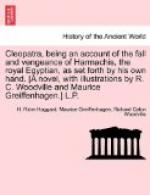We sat long taking counsel, till at length, in face of the great emergency and our high emprise, I felt something of the spirit of former days flow back into my heart. At the last all was ordered, and so ordered that it could scarce miscarry, for it was fixed that if by any chance I could not come to slay Cleopatra on this night, then the plot should hang in the scale till the morrow, when the deed must be done upon occasion. For the death of Cleopatra was the signal. These matters being finished, once more we stood and, our hands upon the sacred symbol, swore the oath that may not be written. And then my uncle kissed me with tears of hope and joy standing in his keen black eyes. He blessed me, saying that he would gladly give his life, ay, and a hundred lives, if they were his, if he might but live to see Egypt once more a nation, and me, Harmachis, the descendant of its royal and ancient blood, seated on the throne. For he was a patriot indeed, asking nothing for himself, and giving all things to his cause. And I kissed him in turn, and thus we parted. Nor did I ever see him more in the flesh who has earned the rest that as yet is denied to me.
So I went, and, there being yet time, walked swiftly from place to place in the great city, taking note of the positions of the gates and of the places where our forces must be gathered. At length I came to that quay where I had landed, and saw a vessel sailing for the open sea. I looked, and in my heaviness of heart longed that I were aboard of her, to be borne by her white wings to some far shore where I might live obscure and die forgotten. Also I saw another vessel that had dropped down the Nile, from whose deck the passengers were streaming. For a moment I stood watching them, idly wondering if they were from Abouthis, when suddenly I heard a familiar voice beside me.
“La! la!” said the voice. “Why, what a city is this for an old woman to seek her fortune in! And how shall I find those to whom I am known? As well look for the rush in the papyrus-roll.[*] Begone! thou knave! and let my basket of simples lie; or, by the Gods, I’ll doctor thee with them!”
[*] Papyrus was manufactured
from the pith of rushes. Hence
Atoua’s saying.—Editor.
I turned, wondering, and found myself face to face with my foster-nurse, Atoua. She knew me instantly, for I saw her start, but in the presence of the people she checked her surprise.
“Good Sir,” she whined, lifting her withered countenance towards me, and at the same time making the secret sign. “By thy dress thou shouldst be an astronomer, and I was specially told to avoid astronomers as a pack of lying tricksters who worship their own star only; and, therefore, I speak to thee, acting on the principle of contraries, which is law to us women. For surely in this Alexandria, where all things are upside down, the astronomers may be the honest men, since the rest are clearly knaves.” And then, being by now out of earshot of the press, “royal Harmachis, I am come charged with a message to thee from thy father Amenemhat.”




